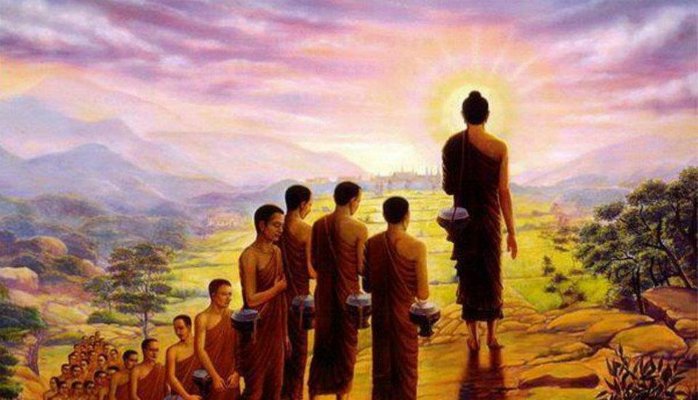-
67 February 25, 2016
-
I never walk backward
42 February 25, 2016 -
Real love is wisdom
Comment February 22, 2016Real love is wisdom. What most people think of as love is just an impermanent feeling. If you have a nice taste every day, you will soon get tired of it. In the same way, such love eventually turns into hatred and sorrow. Such worldly happiness involves clinging and is always tied up with suffering, which comes like the policeman following the thief.
Nevertheless, we cannot suppress nor forbid such feelings. We just should not cling to or identify with them but should know them for what they are. Then Dharma is present. One loves another, yet eventually the beloved leaves or dies. To lament and think longingly, grasping after that which has changed, is suffering, not love. When we are at one with this truth and no longer need or desire, wisdom and the real love that transcends desire fill our world. ~Ajahn Chah
-
The Story of the Bhikkhu who Contemplates the Body as a Mirage
Comment February 22, 2016Dhammapada Verse 46
Maricikammatthanika bhikkhu VatthuPhepnupamam1 kayamimam viditva
maricidhammam2 abhisambudhano
chetvana marassa papupphakani3
adassanam maccurajassa gacche4Verse 46: One who knows that this body is impermanent like froth, and comprehends that it is insubstantial like a mirage, will cut the flowers of Mara (i.e., the three kinds of vatta or rounds), and pass out of sight of the King of Death.
1. Phepnupamam: like froth; it means that this body is perishable and impermanent like froth.
2. maricidhammam: lit., mirage + nature; nature of a mirage, i. e., insubstantial like a mirage.
3. marassa papupphakani: flowers or flower-tipped arrows of Mara. These flowers or arrows of Mara represent the tivattam or the three kinds of vattam (rounds), viz., kilesavattam ( the round of moral defilements), kammavattam (the round of volitional action) and vipakavattam (the round of resultant effects). According to the Commentary, this chain or round is broken when cut by the sword of ariya magga nana.
4. adassanam maccurajassa gacche: In this context, out of sight of the King of Death means the realization of Nibbana.
The Story of the Bhikkhu who Contemplates the Body as a Mirage
While residing at the Jetavana monastery, the Buddha uttered Verse (46) of this book, with reference to a certain bhikkhu.
On one occasion, a certain bhikkhu, after taking a subject of meditation from the Buddha, went to the forest. Although he tried hard he made little progress in his meditation; so he decided to go back to the Buddha for further instruction. On his way back he saw a mirage, which, after all, was only an illusive appearance of a sheet of water. At that instant, he came to realize that the body also was insubstantial like a mirage. Thus keeping his mind on the insubstantiality of the body he came to the bank of the river Aciravati. While sitting under a tree close to the river, seeing big froths breaking up, he realized the impermanent nature of the body.
Soon, the Buddha appeared in his vision and said to him, “My son, just as you have realized, this body is impermanent like froth and insubstantial like a mirage.”
Then the Buddha spoke in verse as follows:
Verse 46: One who knows that this body is impermanent like froth, and comprehends that it is insubstantial like a mirage will cut the flowers of Mara (i.e., the three kinds of vatta or rounds), and pass out of sight of the King of Death.
At the end of the discourse the bhikkhu attained arahatship.Source: Tipitaka
-
Compassion is the ground of happiness
Comment February 21, 2016 -
The Story of Soreyya
Comment February 21, 2016Verse 43: Not a mother, nor a father, nor any other relative can do more for the well-being of one than a rightly-directed mind can.
- seyyaso: still better; here it means much better service; because it (the rightly-directed mind) can lead one to the well-being of a man and of a deva and even to the realization of Nibbana.
The Story of Soreyya
While residing at the Jetavana monastery, the Buddha uttered Verse (43) of this book, with reference to Soreyya, the son of a rich man of Soreyya city.
On one occasion, Soreyya accompanied by a friend and some attendants was going out in a luxurious carriage for a bath. At that moment, Thera Mahakaccayana was adjusting his robes outside the city, as he was going into the city of Soreyya for alms-food. The youth Soreyya, seeing the golden complexion of the thera, thought, “How I wish the thera were my wife, or else that the complexion of my wife were like that of his.” As the wish arose in him, his sex changed and he became a woman. Very much ashamed, he got down from the carriage and ran away, taking the road to Taxila. His companions missing him, looked for him, but could not find him.
Soreyya, now a woman, offered her signet ring to some people going to Taxila, to allow her to go along with them in their carriage. On arrival at Taxila, her companions told a young rich man of Taxila about the lady who came along with them. The young rich man, finding her to be very beautiful and of a suitable age for him, married her. As a result of this marriage two sons were born; there were also two sons from the previous marriage of Soreyya as a man. Continue reading
-
The Mendicant
Comment February 21, 2016Control of the eye is good; good is control of the ear;
control of the nose is good; good is control of the tongue.
Control of the body is good; good is control of speech;
control of thought is good; good is control of all things.
A mendicant controlled in all things is freed from sorrow.Whoever controls one’s hand, whoever controls one’s feet,
whoever controls one’s speech, whoever is well-controlled,
whoever finds inner joy, who is collected,
who is alone and content they call a mendicant.The mendicant who controls one’s tongue,
who speaks wisely and calmly, who is not proud,
who illuminates the meaning of the truth,
that one’s words are sweet.Whoever lives in the truth, who finds joy in the truth,
meditates on the truth, follows the truth,
that mendicant does not fall away from the truth.Let one not despise what one has received
nor envy others.
A mendicant who envies others does not find peace.
A mendicant, who, though receiving little,
does not despise what one has received,
even the gods praise, if one’s life is pure and not lazy.Whoever never identifies with name and form
and whoever does not grieve from not having anything
is called a mendicant.The mendicant who lives in friendliness
with confidence in the doctrine of the Buddha
will find peace, the blessed place where existence ends.Empty the boat, mendicant;
when emptied it will go quickly.
Having cut off desire and hate, you will go to freedom.Cut off the five; get rid of the five; master the five.
A mendicant who has freed oneself from the five chains
is called “one who has crossed the flood.”Meditate, mendicant; do not be careless.
Do not think of pleasures
so that you may not for your carelessness
have to swallow the iron ball,
so that you may not cry out when burning, “This is painful!”
There is no meditation for one without wisdom,
no wisdom for one without meditation;
whoever has wisdom and meditation is close to nirvana.A mendicant who with a peaceful heart
has entered an empty house,
has more than human joy when seeing the truth clearly.
When one has comprehended
the origin and destruction of the elements of the body,
one finds happiness and joy
which belong to those who know the eternal.This is the beginning here for a wise mendicant:
control of the senses, contentment,
living according to the moral law,
associating with friends
who are noble, pure, and not lazy.Let one live in love;
let one be adept in one’s duties;
then joyfully one will see the end of sorrow.
As the jasmine sheds its withered flowers,
people should shed desire and hate, mendicants.A mendicant is said to be calm
who has a calm body, calm speech, and a calm mind,
who has mastered oneself
and rejected the baits of the world.Lift up your self by yourself;
examine your self by yourself.
Thus self-protected and attentive
you will live joyfully, mendicant.
For self is the master of self;
self is the refuge of self.
therefore tame yourself,
like a merchant tames a noble horse.Joyful and faithful in the doctrine of the Buddha,
the mendicant finds peace,
the joy of ending natural existence.
Whoever, even as a young mendicant,
applies oneself to the path of the Buddha
illuminates this world,
like the moon when free from clouds.~The Dhammapada
-
My Sleeping Angel
42 February 20, 2016My sleeping angel
I opened my eyes and saw an angel
I took his hand and he lead me to paradise
we sat and our fate was revealed
I saw destiny within his smile
happiness was in his heart
and this dream was inside my head
I awoke just as I asleep
but now with you inside my life
and your love inside my soulKel Price | Source: familyfriendpoems
-
Good Night World
68 February 20, 2016Day is dying in the west,
time has gone we love the best
Now no more is left to say, but,
thank you for a lovely day
What delights we had, to make us glad
You made me laugh, you touched my heart
While angels keep, our dreams so sweet
All will be well ’til next we meet~Soft Whispers from Derry’s Heart Poems
-
Bridge of Love
67 February 20, 2016God is building
A Bridge of Love
That spans across the SeaHe is broken down
The middle wall
And is Birthing unityThe Bridge is anchored
On the rock
It’s supported by pillars of PrayerAnd those who are called
To cross over it
Need only love and careUse me, Lord
Use me!~By Jack Huffman
Mt. Forest, Ontario


















